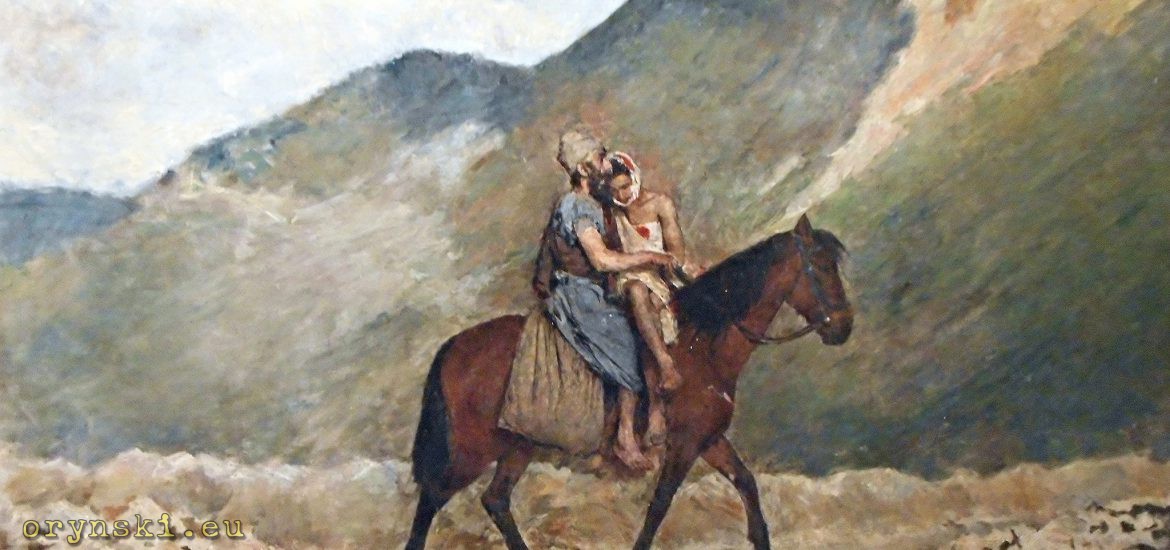Krzysztof Bosak, one of the leaders of Polish radical right, goes to the church every Sunday, as the true Pole and Catholic should do. But he is not just a passive listener of the summons – he takes it on himself as well to spread the Gospel, for example on Twitter. But when one filters the words of Jesus through the lens of nationalist ideology, is the message still carried over? I’ve decided to make it into
Yesterday’s gospel was the parable of the Good Samaritan. It is being unfairly used by the proponent of mass migrations. But one has to read it carefully: the Samaritan did not give shelter to the victim in his own home, he helped him where he found him and paid for his treatment.
If the basic thing in the teaching of Jesus was to host the victim and his wife and children in one’s house, or in the church or at the vicarage, then Jesus would surely mention that. But obviously, this is not what he expects from us. We should help, but wisely and with our own good in mind!
– wrote Bosak on his Twitter page a couple of days back. For those like me, who visit only those churches that have been converted into the pubs, let’s have a read at the Gospel of St. Luke again:
Luke 10:25-37 World English Bible (WEB)
25 Behold, a certain lawyer stood up and tested him, saying, “Teacher, what shall I do to inherit eternal life?”
26 He said to him, “What is written in the law? How do you read it?”
27 He answered, “You shall love the Lord your God with all your heart, with all your soul, with all your strength, and with all your mind;[a] and your neighbor as yourself.”[b]
28 He said to him, “You have answered correctly. Do this, and you will live.”
29 But he, desiring to justify himself, asked Jesus, “Who is my neighbor?”
30 Jesus answered, “A certain man was going down from Jerusalem to Jericho, and he fell among robbers, who both stripped him and beat him, and departed, leaving him half dead.
31 By chance a certain priest was going down that way. When he saw him, he passed by on the other side.
32 In the same way a Levite also, when he came to the place, and saw him, passed by on the other side.
33 But a certain Samaritan, as he traveled, came where he was. When he saw him, he was moved with compassion,
34 came to him, and bound up his wounds, pouring on oil and wine. He set him on his own animal, and brought him to an inn, and took care of him.
35 On the next day, when he departed, he took out two denarii, and gave them to the host, and said to him, ‘Take care of him. Whatever you spend beyond that, I will repay you when I return.’
36 Now which of these three do you think seemed to be a neighbor to him who fell among the robbers?”
37 He said, “He who showed mercy on him.”
Then Jesus said to him, “Go and do likewise.”
Now, let’s look again at what Krzysztof Bosak says:
“one has to read it carefully: the Samaritan did not give shelter to the victim in his own home, he helped him where he found him and paid for his treatment.”
He obviously hasn’t read the Gospel carefully himself. Has Samaritan really helped the victim on the spot? Yes, but then he took him to the inn – that is, to a place, when the victim will be safe, from elements, wild animals and other criminals.
It’s true, the Samaritan haven’t taken the victim to his own house (probably because it would be too far, being a Samaritan he was probably from Samaria, which is quite a distance north from the road connecting Jerusalem and Jericho), but this is a strawman fallacy anyway: nobody says we should indiscriminately take random refugees to couch surf in our living rooms. But we should make sure, that they don’t suffer from cold and hunger, and that they are safe from dangers they fled from. In a longer perspective, we should also make sure, that they can have access to a quality health service, jobs and education and generally have a decent life. Is it possible to ensure all those things in the tent camp somewhere in the middle-eastern desert?
The Good Samaritan obviously thought along those lines as well. He hasn’t satisfied himself with providing the victim with the shelter where he found him. He didn’t tell him “here, have this blanket,
“If the basic thing in the teaching of Jesus was to host the victim and his wife and children in one’s house, or in the church or at the vicarage, then Jesus would surely mention that. “ – continues Bosak. And he’s right. There is no mention in this parable that the Samaritan should take the victim to his home, or place him in the church or at the
But this heart of the message is wasted on Krzysztof Bosak. And not only on him, which is a shame. Because Poland AD 2018 seems as nothing has changed since the times when Jesus walked the Earth: Catholics have their mouths full of the Gospel, but when we have a refugee crisis when thousands of humans are in need, strangely those scorned leftists are first to help.
Picture: “The Good Samaritan”, Alfonso Cattaneo, circa 1890. Public Domain





